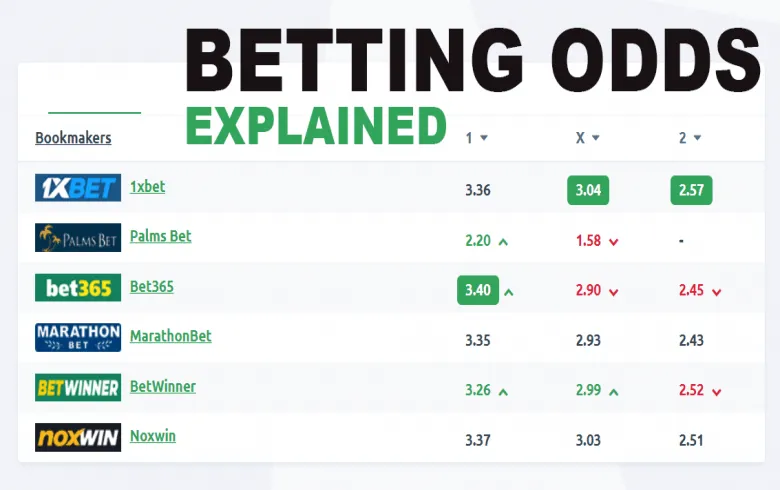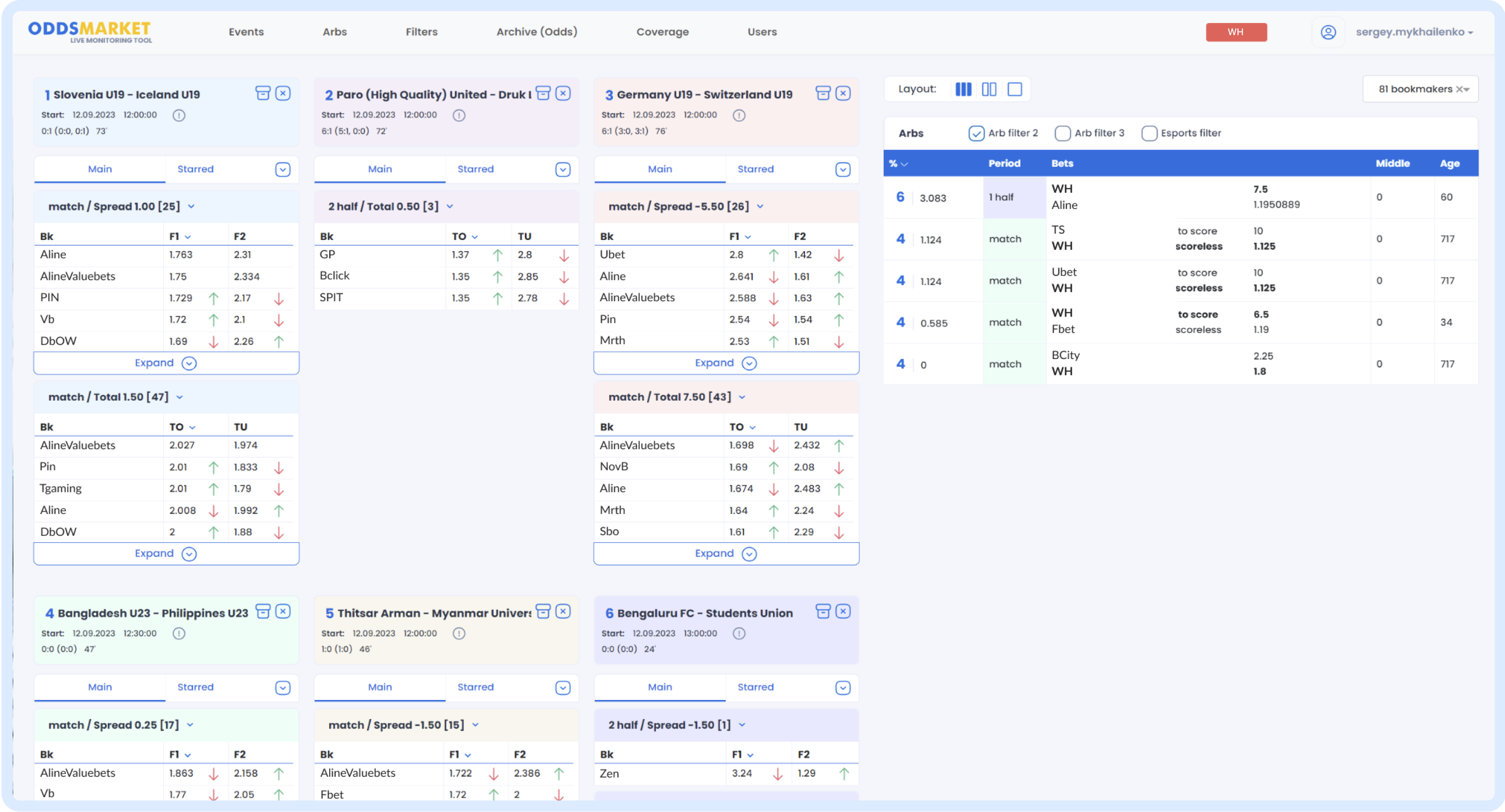As sports betting continues to gain popularity, more and more people are looking for ways to increase their chances of winning. One key aspect to consider when placing a bet is the odds offered by bookmakers. Understanding how to check bookmakers odds can not only help you make smarter bets, but also give you an edge over other bettors.
In this article, we will delve into the world of bookmakers odds and provide you with a comprehensive guide on how to check and interpret them. We will cover everything from basic definitions to advanced strategies, so that you can become a pro at evaluating odds and making informed betting decisions. So without further ado, let’s get started!

1. Understanding Bookmakers Odds
What are Bookmakers Odds?
Bookmakers odds, also known as betting odds, are numerical representations of the likelihood of a particular outcome in a sporting event. In simpler terms, it is the probability of an event occurring presented in a format that allows bettors to calculate their potential winnings.
For example, in a football match between Manchester United and Liverpool, a bookmaker may offer the following odds for a Manchester United win: 2.50. This means that if you place a $100 bet on Manchester United and they win, you will receive a payout of $250 (2.50 x $100).
Types of Odds Formats
There are three common types of odds formats used by bookmakers: decimal, fractional, and American odds. Let’s take a closer look at each one:
- Decimal Odds: As seen in the Manchester United vs Liverpool example, decimal odds are presented with two decimal places (e.g. 2.50). They are the most commonly used odds format in Europe and Canada, and are also becoming increasingly popular in other parts of the world. To calculate potential winnings, you simply multiply your stake by the decimal odds.
- Fractional Odds: Fractional odds are represented as a fraction (e.g. 5/2). They are the traditional odds format in the UK and Ireland, and are still widely used in horse racing. The first number in the fraction represents the potential profit, while the second number is the amount you need to stake to win that profit. For example, if you place a $100 bet on 5/2 odds, you will receive a $250 payout ($100 x 5/2).
- American Odds: Also known as moneyline odds, American odds are primarily used in the United States. They can be either positive or negative, depending on whether the outcome is likely or unlikely. Positive odds indicate the potential profit for a $100 stake, while negative odds indicate the amount you need to stake to win $100. For example, if the American odds for a team winning are +150, a $100 bet would result in a $150 profit. If the odds are -150, you would need to bet $150 to win $100.
Calculating Implied Probability
As mentioned earlier, bookmakers odds can be used to calculate the implied probability of an outcome. This is simply the likelihood of an event occurring based on the odds offered by a bookmaker. The formula for calculating implied probability varies depending on the odds format:
- Decimal Odds: To calculate the implied probability of decimal odds, simply divide 1 by the decimal odds. For example, if the odds are 2.50, the implied probability would be 1/2.50 = 0.40 or 40%.
- Fractional Odds: To calculate the implied probability of fractional odds, divide the second number (stake) by the total (stake + profit). For example, if the odds are 5/2, the implied probability would be 2/(2+5) = 2/7 = 0.2857 or 28.57%.
- American Odds: The formula for calculating implied probability for American odds differs depending on whether they are positive or negative:
- Positive Odds: Divide the odds by 100 and add 1. For example, if the odds are +150, the implied probability would be (150/100) + 1 = 2.50 or 40%.
- Negative Odds: Divide 100 by the odds plus 100. For example, if the odds are -150, the implied probability would be (100/(150+100)) = 0.4 or 40%.
How Bookmakers Set Odds
Bookmakers take into account all kinds of factors when setting odds for a particular event. These include team statistics, player performance, head-to-head records, and external factors such as weather conditions and injuries. They also consider the betting patterns of their customers and adjust the odds accordingly to balance their books.
Bookmakers often use statistical models and algorithms to calculate the likelihood of different outcomes and determine the odds. They also take into account the opinions and predictions of experts and may adjust the odds based on these factors as well. As a bettor, it is important to understand that bookmakers are in the business of making money, so their odds are not always an accurate representation of the actual probability of an outcome.
2. Evaluating Bookmakers Odds

Now that you have a basic understanding of how bookmakers set odds, let’s take a look at the key factors you should consider when evaluating them.
Factors to Consider
Before placing a bet, it is important to thoroughly analyze all available information about the teams/players involved in the event. This will help you make an informed decision and increase your chances of winning. Some key factors to consider include:
Team/Player Statistics
One of the most important aspects to consider when evaluating bookmakers odds is the performance of the teams or players involved. Look at their recent form, home and away records, and head-to-head statistics. Pay attention to any trends or patterns that may give you an indication of how they are likely to perform in the upcoming event.
Form and Momentum
Form and momentum can play a crucial role in determining the outcome of a sporting event. A team or player who has been performing well in recent matches is more likely to continue that trend, as opposed to one who has been struggling. Keep an eye on current form and any injuries or suspensions that may affect a team’s performance.
Injuries and Suspensions
Injuries and suspensions can significantly impact the performance of a team or player. If a key player is injured or suspended, it can weaken the team and lower their chances of winning. On the other hand, if a team’s star player returns from injury or suspension, it can give them a boost and increase their chances of winning. Always take into account any injury or suspension news when evaluating bookmakers odds.
Head-to-Head Record
As mentioned earlier, head-to-head record is an important factor to consider when evaluating odds. Some teams or players may have a strong history against certain opponents, while others may struggle in particular matchups. This information can be valuable in determining the likelihood of an outcome and should not be overlooked.
Comparing Odds from Different Bookmakers
Another key aspect of evaluating bookmakers odds is comparing them from different bookmakers. As mentioned earlier, bookmakers use various factors to set their odds and may have differing opinions on the likelihood of an outcome. By comparing odds from different bookmakers, you may find better value for a particular bet. However, it is important to keep in mind that odds may change quickly, so it is best to act fast if you find favorable odds.
You can use odds comparison websites to easily compare odds from multiple bookmakers. These websites display odds in various formats and allow you to see the best odds available for a particular event. Some even offer features such as live odds and line movement tracking, which can be useful in making betting decisions.
3. Strategies for Maximizing Bookmakers Odds
Now that you have a good understanding of how to check and evaluate bookmakers odds, let’s take a look at some strategies you can use to maximize your chances of winning.
Value Betting
Value betting is a strategy used by professional bettors to identify bets with higher expected returns than what the odds suggest. In other words, it involves finding odds that are higher than the true probability of an event occurring. For example, if you believe that the odds for a team winning are 2.00, but the bookmaker offers odds of 2.50, that would be considered a value bet.
To successfully implement this strategy, you need to have a good understanding of the sport and the factors that can affect the outcome of an event. You also need to be able to accurately calculate probabilities and estimate odds. Value betting requires patience and discipline, but if done correctly, it can result in long-term profits.
Arbitrage Betting
Arbitrage betting is another strategy used by professional bettors, which involves taking advantage of discrepancies in odds offered by different bookmakers. This strategy requires you to place bets on all possible outcomes of an event with different bookmakers, ensuring a profit regardless of the result.
For example, if one bookmaker offers odds of 2.00 for Team A to win and another offers odds of 2.10 for Team B to win, you can place bets on both outcomes and guarantee a profit. While this may seem like a surefire way to make money, it requires a lot of time and effort to find opportunities and execute bets quickly before odds change.
Hedging
Hedging is a risk management strategy that involves placing bets on multiple outcomes of an event to minimize potential losses. For example, if you have placed a bet on a team to win, but they are losing in the second half, you can hedge your bet by placing a smaller bet on the opposing team. This way, you reduce your overall loss if the original bet does not come through.
Hedging can also be used in situations where there is a potential for a big payout, such as in accumulators or parlay bets. By hedging your bets, you can secure a profit regardless of the outcome. However, it is important to note that hedging will also lower your potential winnings.
4. Using Tools to Analyze Bookmakers Odds
As the world of sports betting continues to evolve, so do the tools available to bettors. These tools can help you analyze bookmakers odds more efficiently and make better-informed betting decisions. Some of the most useful tools include:
Odds Comparison Websites
As mentioned earlier, odds comparison websites can be a valuable resource for bettors looking to compare odds from different bookmakers. They also provide useful features such as live odds and line movement tracking, which can help you stay on top of odds changes and make quicker decisions.
Betting Software
Betting software has become increasingly popular in recent years, offering advanced features and analysis tools for bettors. These software programs use algorithms and statistical models to calculate the probability of outcomes and suggest bets with the highest expected returns. Some even offer features such as live score tracking and in-game statistics, giving bettors an edge over others.
5. Common Mistakes When Checking Bookmakers Odds

While understanding how to check bookmakers odds is crucial for successful betting, it is equally important to avoid common mistakes that can lead to losses. Some of these mistakes include:
Relying on Gut Instincts
One of the biggest mistakes bettors make is relying on gut instincts instead of analyzing all available information. While intuition can sometimes prove to be right, it is not a reliable strategy for long-term success. Always take into account all relevant factors when evaluating odds and making betting decisions.
Chasing Losses
Another common mistake is chasing losses by increasing stakes after a loss in an attempt to recoup losses quickly. This often leads to bigger losses and can be detrimental to your bankroll. It is important to stick to your betting strategy and avoid making impulsive decisions based on emotions.
Ignoring External Factors
As mentioned earlier, external factors such as weather conditions and injuries can significantly impact the outcome of a sporting event. Ignoring these factors or not taking them into account when evaluating odds can lead to inaccurate predictions and potential losses.
6. Conclusion
In conclusion, checking bookmakers odds is a fundamental aspect of successful sports betting. Understanding the different odds formats, calculating implied probability, and evaluating factors such as team statistics and form can give you an edge over other bettors. By using strategies such as value betting, arbitrage betting, and hedging, and utilizing tools like odds comparison websites and betting software, you can increase your chances of making profitable bets. However, it is important to remember that there is no one-size-fits-all approach to betting and finding what works best for you may take time and experimentation. With dedication and discipline, you can become a pro at checking bookmakers odds and make smarter betting decisions. Good luck!

